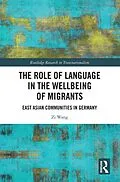This book examines the correlations between language behaviour and happiness amongst communities of migrants, and addresses the overarching question of whether language can affect wellbeing.
Zi Wang takes an innovative look at migration and wellbeing by examining the crucial role language - a quintessential part of the international migration experience - plays in migrants' wellbeing. Drawing on case studies from Chinese and Japanese-speaking communities in Germany, as well as secondary survey data on the general migrant population, Wang shows that proficiency in both host country and heritage languages is associated with robust enhancements of migrants' subjective wellbeing. He argues that acquisition of host country language and the preservation and promotion of heritage culture should not be portrayed as a zero-sum game by stakeholders in host societies. Instead, we ought to consider the unique experiences of migrants in order to fully comprehend the ways in which they experience, evaluate, and pursue happiness in a host society.
Presenting a novel approach to the study of migrants' wellbeing, this book will be of interest to scholars and students of area studies, education, international migration, sociology of language, and wellbeing research.
Autorentext
Zi Wang is a Marie Curie Fellow at the National Institute for Oriental Languages and Civilisations (INALCO) in Paris, France. His research on comparative education, language, migration, and wellbeing has received funding from the German Research Foundation (DFG research grant) and the European Commission (Marie Curie Individual Fellowship).
Inhalt
Foreword by Florian Coulmas
Chapter 1. Language and migrants' wellbeing: An overview
Chapter 2. Language, nation states, and minorities
Chapter 3. Migration-induced diversity and a framework to study language and wellbeing of migrants
Chapter 4. Europe's top migrant destination and two dynamic Asian communities
Chapter 5. Effects of host country language skills on migrants' wellbeing
Chapter 6. Effects of heritage language skills on migrants' wellbeing
Chapter 7. Heritage language maintenance in educational contexts: The role of community-based heritage educational organisations
Chapter 8. Language ideologies in current policies: Issues and benefits of mainstreaming migrant multilingualism
Chapter 9. Epilogue: Migration and wellbeing from the language perspective
Annex: Full regression magnitude tables
